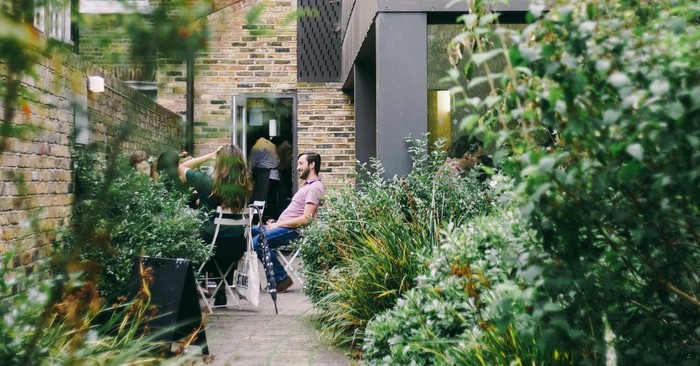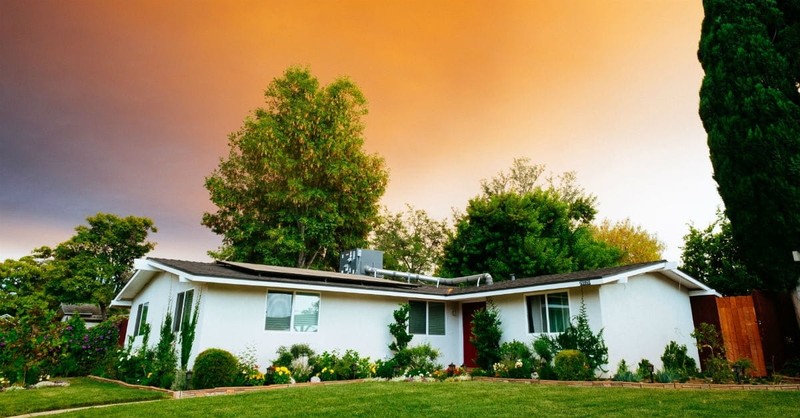
We moved into our suburban neighborhood of carefully manicured tract homes three years ago. Moving to suburbia to plant a church meant that we hit the ground running trying to meet people and make connections. I remember seeing other moms outside and dashing out to meet people — not just to invite them to a neighborhood party, but because I needed friends.
We value neighborliness. It’s why we look for tree-lined streets or picket fences to find community. We imagine that a new home will satisfy or a new friend, or a new neighborhood or job, but most of us actually live our lives not in the front yards but in our back yards.
We chose privacy over welcome. We come home, close our automatic garage doors and build our little kingdoms in the backyard. We buy houses to entertain, but more often than not, find ourselves circling the suburbs in our minivans getting takeout.
Photo Courtesy: Josh Wilburne/Unsplash

Moving from Backyard to Front Yard Faith
If we’re called to provide the welcome of Jesus right in our cul-de-sacs, how do we begin to move from backyard faith to a front yard faith? How do go from our own agendas, our own schedules, our own houses, to welcome others in, not wall others out?
In short, if we know we’re called to be hospitable in the suburbs, how do we start?
Here’s how loving my neighbors went from either something I felt I had to do or something I felt guilty about and instead became an actual practice:
Photo Courtesy: Unsplash/Gus Ruballo

1. We prayed and we just started.
We knew that God had placed us in the spot he wanted us. That meant that our actual neighbors were people he wanted us to meet. So, we prayed. We prayed that being a good neighbor wouldn’t just be something we talked about, but something we did. We prayed that when we were tired or our hearts were hard, God would show up anyway.
Then, we just jumped in. We figured welcoming people in could be awkward. Some people came in and the conversations fell flat. Other people didn’t want to be neighborly, so they’d wave politely when we started conversations. But we just started. We invited people into our home for dinner and dessert — not to tell them about our church but to have good conversations.
Christians should be the most caring people in each neighborhood. It’s only as we start that we get better at loving our neighbors. It’s okay for it to be awkward. Look for needs in your neighborhood, ask questions about the lives of your neighbors, see how you can help and how you can pray for them.
Photo Courtesy: Thinkstock

2. We formed a community.
We had begun dreaming about a welcoming church family in the middle of a busy and inward-turned suburb before we even moved. Another family moved with us and we both committed to being outdoor neighbors. We purposefully hung out in our cul-de-sacs. Kids played together. Neighbors hung out. Conversations began. We persisted even when we didn’t make immediate friends; the point, after all, wasn’t about finding a new best friend to hang out with, the point was to be the welcome of Jesus right in our cul-de-sacs. That meant we didn’t turn new relationships into a new thing to consume.
As our church grew, we had new leaders in our home, monthly. We blocked off time to invite new people from the church and new neighbors to be a part of not just church events but times to hang out informally in our home. Our neighbors and church friends met each other and they saw that church people weren’t scary, weird, or out to convert them on the spot.
Because our friends and neighbors saw us inviting people into our own home, it became natural for us to talk about it. So, when a congregant asked how we were going to grow as a church, the answer was simple, “We’re going to throw great parties.” We’re going to be good neighbors. And we’re going to create a culture of good neighbors.
Photo Courtesy: Thinkstock

3. We found resources.
Within smaller groups, community groups in our church, leadership groups, and even in our family, we talked about hospitality a lot. We found resources and we created plans to move hospitality-in-general--“You should have people over”--to hospitality-in-practice.
Last fall, we all read The Art of Neighboring as a small group. We committed to simply finding out our neighbors’ names and their needs. We followed that up with a summer challenge to eat together as families and to invite neighbors in. Every week, we had people asking us if we’d followed through with what we said we’d do. One family committed to Friday afternoons and nights to be in their front yard. Another family knocked on a neighbor’s door to introduce themselves. As we told each other stories, it didn’t seem as scary to make intentional moves toward our neighbors.
As I was writing Finding Holy in the Suburbs, my research on hospitality informed our conversations, infused our own gatherings, and made it imperative that we move from simply talking about hospitality to living it.
It started small. We embraced awkward. We committed to resources and to a community that affirmed that this mattered. Simply sitting around tables with our neighbors meant we were creating pathways for the gospel. We were creating relationships.
Photo Courtesy: Thinkstock

4. We began habits.
Each month, my husband and I go over our schedules: When are we having newcomers to church over? When are we out for meetings? When do we need intentional down time as a family? And, most important to making hospitality an actual practice, what days are open? Our open days are the days when we plan to have more food on hand for last-minute gatherings or days when it’s okay for one of us to invite people over. Those days, the schedule is already cleared.
We’ve been more and less successful with our open days and we’ve had to scramble to get more ingredients on more than one occasion. But we keep trying, keep welcoming people in, keep looking for neighbors to meet at the park when our kids are playing or we’re out for a walk.
Photo Courtesy: Unplash/ Estee Janssens

How Do We Move from Thinking to Providing the Welcome of Jesus?
So how do you move from thinking you should be a good neighbor to actually providing the welcome of Jesus? Praying and just starting are important — so is forming a community, gaining resources and beginning habits. But only when we first see that we are undeserving of the lavish welcome of God, will we look to welcome others. Only when we recognize we’ve been welcomed, will our hospitality move from “should” to habit. Only when we see how much Jesus lived and died for us will we seek out other people who are lost, just like us.
 Ashley Hales is a writer, speaker, church planter’s wife, and mom to 4 littles in southern California. Ashley has written for places such as The Gospel Coalition, Books & Culture, and ThinkChristian and is writing her first book, Finding Holy in the Suburbs (IVP). Be sure to connect with her at her blog, Facebook, or Twitter. Subscribe to get a free booklet on how to practice sustained attention and chase beauty right where you are.
Ashley Hales is a writer, speaker, church planter’s wife, and mom to 4 littles in southern California. Ashley has written for places such as The Gospel Coalition, Books & Culture, and ThinkChristian and is writing her first book, Finding Holy in the Suburbs (IVP). Be sure to connect with her at her blog, Facebook, or Twitter. Subscribe to get a free booklet on how to practice sustained attention and chase beauty right where you are.
Photo Courtesy: Nina Stehl/Unsplash
Originally published Monday, 16 July 2018.








